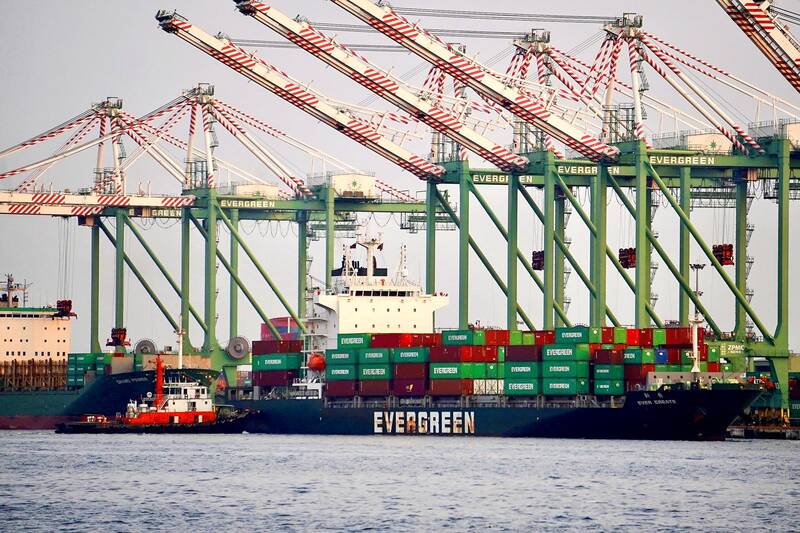Exports last month fell 19.1 percent from a year earlier to US$35.2 billion, contracting for the seventh straight month, as demand for almost all products remained tepid without any sign of recovery in the near term, the Ministry of Finance said yesterday.
The key economic gauge might register a drop of up to 20 percent this month and remain down through the third quarter, Department of Statistics Director-General Beatrice Tsai (蔡美娜) said.
“Taiwan’s exports remain in a tunnel and might not see the light at the other end until the fourth quarter,” Tsai told a news conference, citing the Directorate-General of Budget, Accounting and Statistics (DGBAS).

Photo: CNA
International businesses are generally remaining cautious because their inventories have not yet returned to a healthy level, she said, adding that reports of rush orders are sporadic and not driven by a meaningful and sustained recovery.
Shipments of electronics — particularly chips, passive components, printed circuit boards and others — fell 14.6 percent to US$15.57 billion, as consumers worldwide cut spending on technology products to cope with inflation, she said.
Taiwan Semiconductor Manufacturing Co (TSMC, 台積電), the sole supplier of chips used in Apple Inc’s iPhones, on Monday posted revenue of US$16.56 billion for last quarter, missing its target of US$16.7 billion to US$17.5 billion, she said.
TSMC’s sales data, its worst in four years, largely reflected Taiwan’s export trajectory, although the company fared better than peers and other sectors, Tsai said.
Exports of information and communications technology products, another mainstay category, shrank 15.8 percent after shipments to the US declined for the first time since a global supply realignment, she said.
Non-tech products finished worse, with declines of more than 20 percent, she said.
Shipments of mineral products proved the only exception with a 4.9 percent increase, she added.
Imports fell 20.1 percent to US$30.98 billion, giving Taiwan a trade surplus of US$4.22 billion, although that figure represented a 10.7 percent drop year-on-year, the ministry said.
That change was due to local firms turning conservative about buying capital equipment, as well as industrial and agricultural materials used for exports, Tsai said.
For the first quarter, exports contracted 19.2 percent to US$97.75 billion, while imports sank 15.8 percent to US$88.84 billion, both worse than 15.43 and 13 percent the DGBAS predicted in February, Tsai said.
The agency would likely trim export showings for this quarter as well, when it updates growth figures next month, she said.
The global market appears to need more time to digest excessive inventory, while any benefit of China’s reopening late last year is not yet evident, Tsai said.

Taiwan Semiconductor Manufacturing Co (TSMC, 台積電) yesterday said that its investment plan in Arizona is going according to schedule, following a local media report claiming that the company is planning to break ground on its third wafer fab in the US in June. In a statement, TSMC said it does not comment on market speculation, but that its investments in Arizona are proceeding well. TSMC is investing more than US$65 billion in Arizona to build three advanced wafer fabs. The first one has started production using the 4-nanometer (nm) process, while the second one would start mass production using the

A TAIWAN DEAL: TSMC is in early talks to fully operate Intel’s US semiconductor factories in a deal first raised by Trump officials, but Intel’s interest is uncertain Broadcom Inc has had informal talks with its advisers about making a bid for Intel Corp’s chip-design and marketing business, the Wall Street Journal reported, citing people familiar with the matter. Nothing has been submitted to Intel and Broadcom could decide not to pursue a deal, according to the Journal. Bloomberg News earlier reported that Taiwan Semiconductor Manufacturing Co (TSMC, 台積電) is in early talks for a controlling stake in Intel’s factories at the request of officials at US President Donald Trump’s administration, as the president looks to boost US manufacturing and maintain the country’s leadership in critical technologies. Trump officials raised the

‘SILVER LINING’: Although the news caused TSMC to fall on the local market, an analyst said that as tariffs are not set to go into effect until April, there is still time for negotiations US President Donald Trump on Tuesday said that he would likely impose tariffs on semiconductor, automobile and pharmaceutical imports of about 25 percent, with an announcement coming as soon as April 2 in a move that would represent a dramatic widening of the US leader’s trade war. “I probably will tell you that on April 2, but it’ll be in the neighborhood of 25 percent,” Trump told reporters at his Mar-a-Lago club when asked about his plan for auto tariffs. Asked about similar levies on pharmaceutical drugs and semiconductors, the president said that “it’ll be 25 percent and higher, and it’ll

CHIP BOOM: Revenue for the semiconductor industry is set to reach US$1 trillion by 2032, opening up opportunities for the chip pacakging and testing company, it said ASE Technology Holding Co (日月光投控), the world’s largest provider of outsourced semiconductor assembly and test (OSAT) services, yesterday launched a new advanced manufacturing facility in Penang, Malaysia, aiming to meet growing demand for emerging technologies such as generative artificial intelligence (AI) applications. The US$300 million facility is a critical step in expanding ASE’s global footprint, offering an alternative for customers from the US, Europe, Japan, South Korea and China to assemble and test chips outside of Taiwan amid efforts to diversify supply chains. The plant, the company’s fifth in Malaysia, is part of a strategic expansion plan that would more than triple